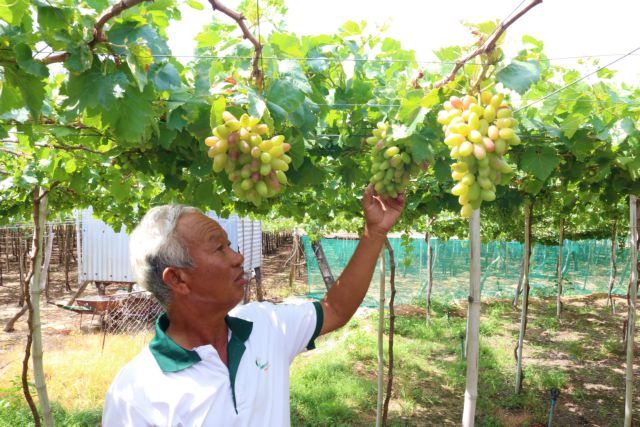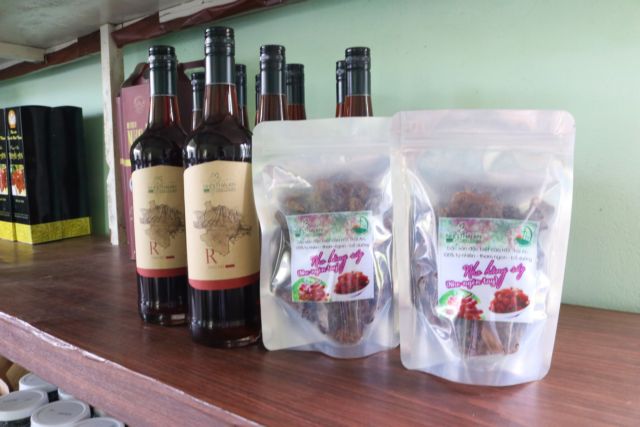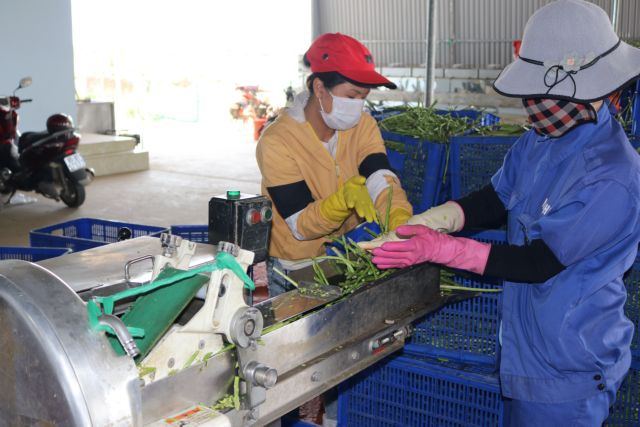 Features
Features

The south-central province of Ninh Thuận plans to have hi-tech agriculture become a key industry with a value growth of between 30 to 40 percent each year.

|
| The Thái An Vineyard in Ninh Thuận Province’s Ninh Hải District. Several vineyards in the province are going hi-tech, aiming at clean and organic farming. – VNS Photo Việt Dũng |
By Việt Dũng
The south-central province of Ninh Thuận plans to have hi-tech agriculture become a key industry with a value growth of between 30 to 40 per cent each year.
Towards this, it has been issuing policies to attract investment into hi-tech agriculture and helping businesses as well as co-operatives apply such technologies.
Trương Khắc Trí, deputy director of Ninh Thuận Province’s Department of Agriculture and Rural Development, told Việt Nam News that the province passed Resolution 5 of the Party Central Committee in 2017 that aimed at providing policy support to the industry, particularly in promoting research and technological transfer.
This had seen the application of technological advances like sprinkler system in agriculture that save water, soilless farming as well as research and development of new, more disease-resistant fruit varieties with higher yields, he said.
The province had 18 hi-tech crop farming projects in operation at present, he added.
“Hi-tech agriculture increases value yielded in each plot of farming land, and farmers are realising that it can help them overcome challenges related to weather and soil quality,” Trí said.
Viticulture, or grape cultivation, that the province is famous for, has seen application of effective hi-tech farming methods under the cooperative model that enables farmers to reap economies of scale.
Nguyễn Khắc Phòng, director of the Thái An General Agriculture Service Cooperative and owner of the Thái An Grape Vineyard, told Việt Nam News that the cooperative had been helping grape growers use sprinklers and drip irrigation systems to prevent overwatering of the vines.
"It is also showing farmers the right way to use fertiliser and guiding them towards clean farming," he said.
“The cooperative plans a trial run of net house organic farming that will limit weather damage and improve grape quality.”
It will also work with the local Centre for Application of Science and Technology to teach farmers how to use chitosan, a substance made with shrimp shells, to preserve grapes for longer, improving their value.
Researchers from the Nha Hố Research Institute for Cotton and Agriculture Development and the Department of Science and Technology have created two new seedless grape varieties and grown them on a trial basis.
Table varieties NH04-61 and NH04-128 grow well, fruit easily and are resistant to disease, the institute has found. It is researching and applying some more advanced techniques to improve the size, weight and sweetness of these varieties.
It will seek permission for commercial cultivation of these varieties from the Ministry of Agriculture and Rural Development and other relevant agencies, according to the institute.
The processed food industry related to grapes is also being promoted and products like wine, raisins, juices and syrups are being made in the province.
The vineyards in the province are also popular tourism spots that earn additional income for farmers, with some tours allowing visitors to handpick grapes, take photographs and have a good time.

|
| Grapes harvested in the province are processed into wine and raisins. – VNS Photo Việt Dũng |
Trần Duy Hải, deputy general director of the Nha Hố Cultivar JSC in the province’s Nha Hố Village, told Việt Nam News that in the past two years, the company had been focusing on growing organic green asparagus.
Its farming model now spans 30 hectares, one of the biggest in Ninh Thuận; and it applies a drip irrigation system and uses organic fertiliser.
The company has also invested in deep processing technology, including a crop washing machine, a dicing machine and a freeze drying system to preserve the flavour and colour of bamboo shoots while processing them into powder.
Officials estimate that hi-tech agriculture yields VNĐ600 million (US$26,300) per year per hectare, with some models fetching even higher returns, exceeding VNĐ1 billion per hectare.
Application of such technologies are not only showing great returns, but are also changing the minds of farmers on the importance of hi-tech farming and following quality standards such as VietGAP and GlobalGAP.

|
| Workers at the Nha Hố Cultivar JSC in Nha Hố Village use a machine to dice green asparagus to make powders. Ninh Thuận is promoting deep processing technologies to add value to its farm produce. – VNS Photo Việt Dũng |
Key to growth
Ninh Thuận has identified hi-tech agriculture development linked with processing, exporting and tourism as a key industry for the province’s socio-economic development.
Deputy director Trí of the provincial agriculture authority, said that hi-tech development would be part of agricultural reforms undertaken by the province, focusing on creating specialty products that are highly competitive.
Among several activities aimed at fostering hi-tech agriculture, Ninh Thuận would spread public awareness of the industry, promote deep processing technologies, invest in infrastructure in hi-tech agriculture areas, and encourage research into new breeds and production technologies.
The province would also facilitate cooperation between farmers, businesses and scientists in hi-tech agriculture, including helping businesses and cooperatives network with farmers.
It planned to have around 1,000 hectares under hi-tech farming by 2025. VNS




